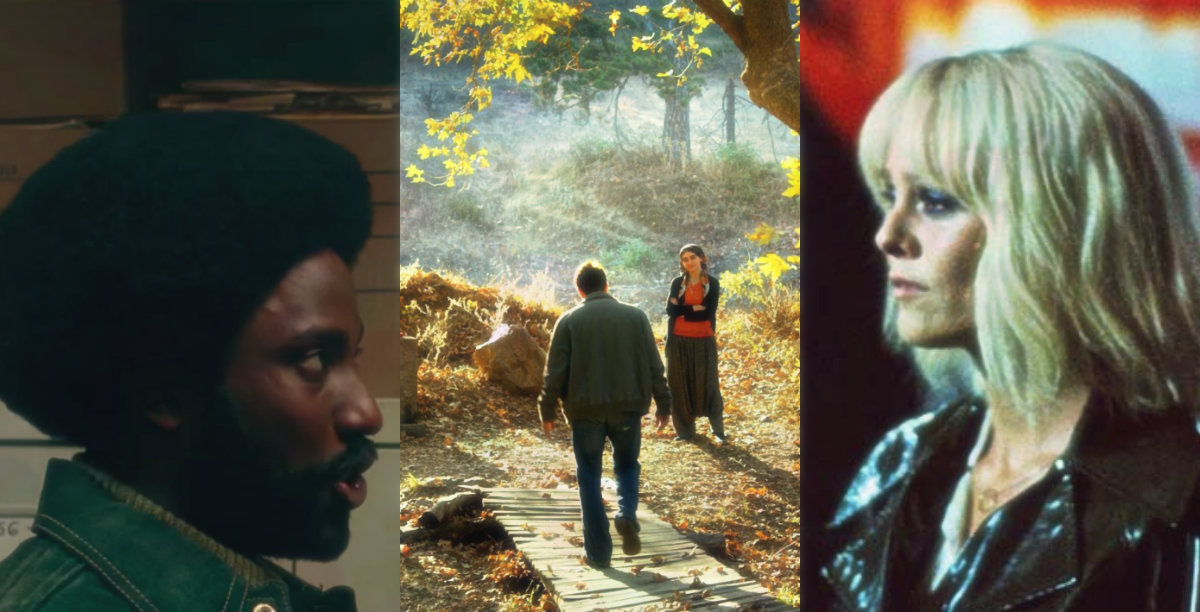
TLDR: I share a few tricks about how to stay hydrated and sane at the festival, and review what was easily my favorite day in film. BlacKkKlansman is a howl of outrage at the racism in the core of American institutions, provocative and powerful; Knife + Heart is an exercise in eroticism that feels like Refn-lite, bold open then fizzle; The Wild Pear Tree sees Ceylan going full Linklater with a sprawling epic on wisdom, creativity, and the idealism of youth.
Intro
Friday was my favorite day of the [mini-]festival for a number of reasons. Day 0, acted as a cold shower after an all-night bender, a jolting cleanse of the palate. It featured one of the more provocative films of the festival, but I wasn’t quite ready to handle it. Day 1 was pleasant but lopsided: outside the cinema was all chaos and uncertainty, inside was predictable and fairly surface level, featuring three enjoyable entries which accomplished their goals but asked very little of me. Day 2 is where it all starts to really click.
First order of business: I finally had a handle on the festival. I knew where every theatre was, and roughly how early one needed to arrive in line (pro tip: 2 hours was a guarantee every time, 90 minutes still plenty in hindsight). I had a schedule in my pocket with a clearly laid out timeline and room for coffee breaks. I had learned to keep a bag with a 50cl bottle of water (the maximum allowed past security) with me at all times, and knew the handful of places where said bottles could be replenished. Perhaps most importantly, I realized the “smartly dressed” requirement of non-gala screenings was basically a euphemism for “try to not be naked.” No suit, no bowtie, no goddamn tuxedo shoes: those could all be retrieved from my AirBnB after movie #2 or (spoilers for day 3) stuffed in a canvas bag next to the Kind bars. Honestly, would I look any less out of place next to Cate Blanchett if my bottom shelf Men’s Wearhouse jacket had ten fewer wrinkles? Embrace your lower social stratum. I cannot stress how much better a comfy tee and Allbirds feel after two days of sweating into the same suit.
Second: the movies were more interesting across the board. Which isn’t necessarily to say they were the best (at least one was, in my opinion, a contender for worst); only that they provoked a much stronger reaction. So let’s get to the reactions!
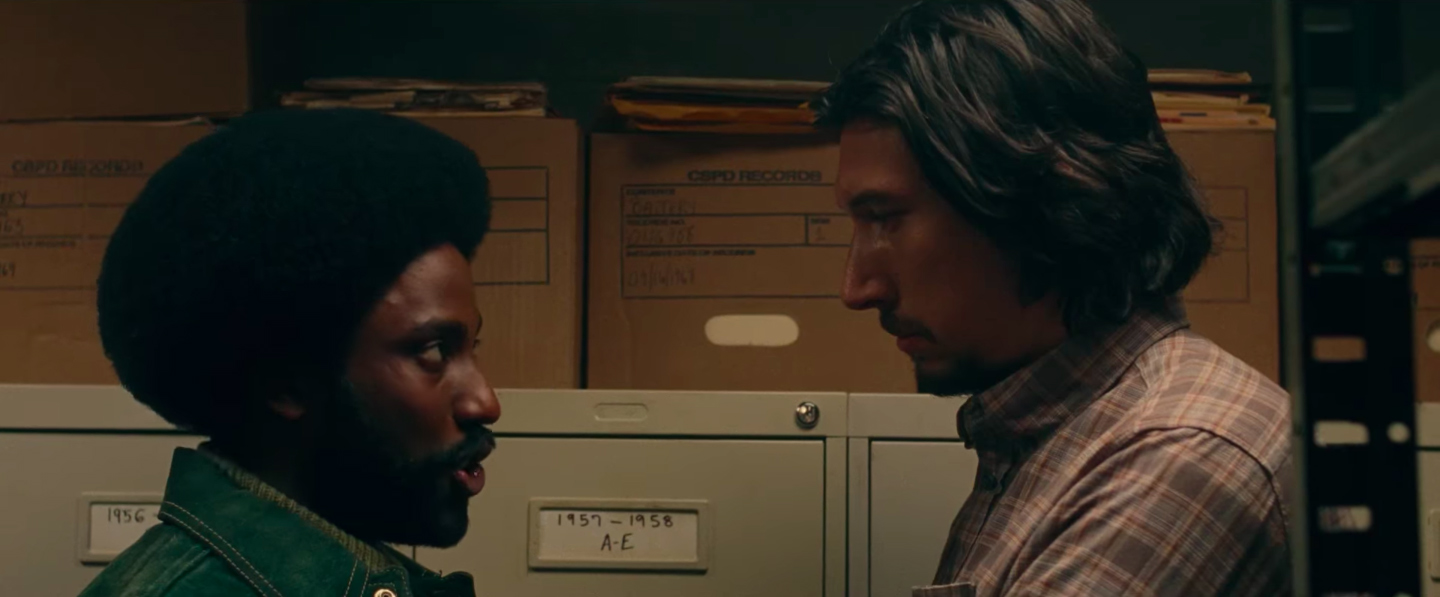
After missing Capernaum and then nearly missing Sorry Angel, I decided to take no chances with the first-come-first-served policy — particularly when it came to my most anticipated film of the festival. So, by 7:30am, I was already croissant-stuffed, caffeinated, and happily in line for the 9:30 showing of BlacKkKlansman. Behind at least 50 other patrons, who I can only imagine are either related to Spike Lee or physically incapable of sleep.
They were right to wait it out, though. BlacKkKlansman is dynamite draped in an American flag and stuffed in a disco ball at Tomi Lahren Karaoke Night in the local oil refinery. Which is to say, Lee still knows how to pack a goddamn punch. If Birth of a Nation was “history written with lightning”, Lee’s film is history written with fifty pounds of C-4. Or, maybe, it’s the terrifying present written in history’s ink.
For the uninitiated: in 1979, an undercover police officer by the name of Ron Stallworth successfully joined the Colorado Springs chapter of the Ku Klux Klan. What began as an epithet-filled phone tirade to gather intel, snowballed into 9 months of in-person meetings, thwarted cross burnings, and a direct conversation with (not making this up) David Duke. In addition to being one of the first major infiltrations of the post-Civil-Rights era KKK by a local police force, the story is made all the more poignant by one minor detail: Stallworth is a black man. The first black man, in fact, to ever serve in the Colorado Springs police department.
That’s all I know of the underlying true events. What follows, in Spike’s take, is an audacious mash-up of genres and themes, pairing heavy subject matter with disarmingly playful tropes. It’s an incisive examination of policing in America and its intractably racist impact, but it’s also a fist-pumping buddy cop flick — seemingly without irony. It’s a searing look at racial resentment and the wild delusions it breeds at every level of society, played as an Us-vs-Them satire with a narrowly-defined group of Bad Guys. It’s very brutal and very sad, confronting bigotry and hate speech with more directness than I’ve seen in years. But it’s also, somehow, riotously funny — when it chooses to be.
I recognize that, as a white filmgoer, I am profoundly at risk of missing the point here: Dave Chapelle and my generation’s subsequent purple-drinking horde of laughing-for-all-the-wrong-reasons frat bros come to mind. So it’s tempting to understate the humor of the premise; to downgrade “riotously funny” into “acerbic takedown” or “biting satire” and maintain healthy detachment from the comic beats. And yet I think it’d be a huge disservice to Lee to do so, to ignore what might be his most ferocious talent: baldly provoking the audience, playing meticulously-tuned contradictions. Yes, BlacKkKlansman is an acerbic takedown of America’s quote evolution on race endquote, and it’s also a biting satire of the “good people on both sides” doublespeak that persists today. But it isn’t only that. It’s also endearing, and screwball, and moving, and hopeful while simultaneously despairing of hope. It basks both in pride and despair, reveling in dance scenes and communal gatherings and firebrand speeches with rapt young audiences, while reminding us how far there is to go. It’s powerfully cynical and, also, urgently not. It expresses the inherent contradiction of being black in America, and particularly black in American law enforcement — a battle of psyches well reflected in popular culture of the era. “Archie Bunker made bigotry a joke” notes one onscreen officer, but television never could decide which America to take seriously. Is it Andy Griffith’s or Amos n’ Andy’s? Is it Starsky and Hutch’s Gran Torino, or Bo and Luke’s Confederate Dodge? It’s clear that the system is broken, that these technicolored fictions can’t peacefully coexist — Good Cop Saves The Day, Bad Cop Has A Heart Of Gold, Defiantly Individualistic Cop Does It Alone And Wins The Support Of His Chief. But that doesn’t make those dreams any easier to abandon, or any less tempting to take for a spin.
Our hero, Ron Stallworth (John David Washington), is the perfect audience surrogate. He’s as quick-witted and idealistic as we’d wish ourselves to be, and as prone to self-doubt as we genuinely are. He thinks he can do good from within the force, but it’s never clear whether his tenuous alliance is propping up something worth saving. Part of that doubt comes from Patrice (Laura Harrier), a black student activist he falls for while undercover. She thinks there can be no hedging, no middle ground: if the institution is inherently racist, it can’t be changed from within. One apparent argument to the contrary is Flip (Adam Driver), Ron’s partner on the force. He seems, by all accounts, to be a bona fide Good Cop — good partner, good friend, doesn’t think much of race but lands generally on the right side when he does. While Ron climbs the Klan hierarchy primarily by phone, Flip acts as his stand-in for all face-to-face meetings. A Jew in a room of devout anti-Semites, all that hate speech sounds nearly as ridiculous coming from his mouth as it does from Ron’s. Or at least, on paper, it ought to. His ability to stand idly by while others use it, well, that tracks a bit better.
Bill Hicks once joked that the most fervent Creationists often look the most “un-evolved.” Judging by the Klan depicted here, a similar dictum might hold: those who shout “white power” seem to be the biproduct of a gene repository more bathtub- than pool-sized. There’s befuddled Ivanhoe (Paul Walter Hauser), effectively reprising the role of I, Tonya’s Shawn but with slightly more discernible delusions. There’s also the vapidly conniving Felix (Jasper Pääkkönen), a conspiracy-theorizing gun nut who keeps a “Jew-detector test” in his basement, and his wife Connie (Ashlie Atkinson), who supports to her husband’s bigotry with the precise gusto she might support a Defense Of Marriage bake sale at her local Focus On The Family outing. And, of course, there is David Duke (Topher Grace), whose faux intellect and political sheen seem poised to delude an audience of precisely one — himself.
Much like Do The Right Thing, BlacKkKlansman is content to be one thing — excellently — for the bulk of its runtime, before a last-minute pivot sets the whole thing ablaze. In the former film (also a hit at Cannes), I believe that sudden rush of feeling was absolutely vital to its meaning; it’s the hindsight thesis, and it would be as hard to discuss without spoiling as it would be a terrible thing to spoil. In the case of BlacKkKlansman, though, the moment in question is less a twist than an urgent coda. A spoiler would be neither particularly ruinous nor necessary.
So I’ll just say this. In the last few minutes, Spike makes explicit what ought have been weighing on any conscientious audience: that this may play as a comedic period piece with an upbeat ending, but the subjects it deals with are neither funny nor confined to history. And that happy endings are only the exceptions which prove the rule. All the anger and hindsight hopelessness, left as (fierce) subtext throughout the runtime, is finally given room to scream. It’s a gut-wrenching underline, relating the Department’s “both extremists are dangerous” complacency to that of a certain sitting president in the wake of Charlottesville (more of my thoughts here). While Spike’s vision would have held up wonderfully without this moment, I think we’re in a far better — if, admittedly, more hopeless — place for its inclusion. It’s damning, confrontational, and exactly as pull-the-rug-out-from-under-you unexpected as it ought to be. In my audience, you could hear a pin drop as the credits rolled. I hope yours reacts the same. Comfort isn’t a luxury we have any right to demand.
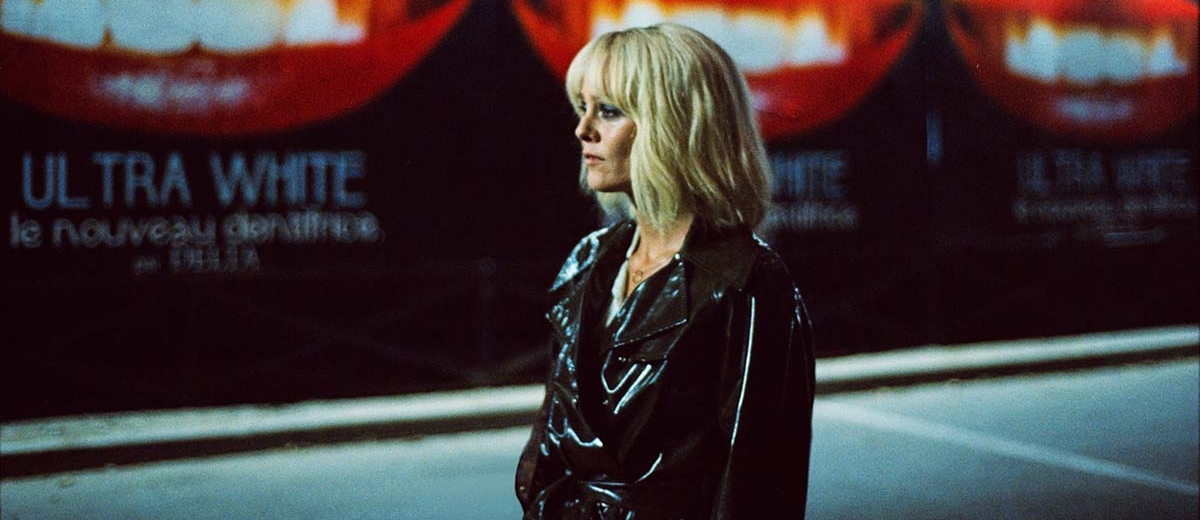
Knife + Heart (2.5/5)
After being knocked over the head by a film which deserves a lengthy discussion, I sprinted to the Soixantième Theatre to catch another which, in hindsight, warrants very little. Yann Gonzalez’s Knife + Heart (Un couteau dans le coeur) is one of those features that would have benefited greatly from a featurette runtime; it starts with a bang (in more ways than one, hyuck hyuck), but gradually worsens as its story unfolds.
It’s France, it’s the 1970’s, and love is in the air. Also porn. And murder. And, somehow, M83. The film follows Anne (Vanessa Paradis), a director/producer in a low budget gay porn studio who longs to win back her former lover / current editor Loïs (Kate Moran). When a masked murderer begins targeting members of her cast, Anne’s first response isn’t to stop shooting; it’s to use it as inspiration for a total script rewrite. Thus, Homocidal is born. As more and more elaborate, grisly murders are orchestrated, her script simply absorbs them into its hamfisted plot, causing one to…well, wonder. Is she terrified of being next, and channeling her angst into creativity? Is she fetishizing the brutality happening to her coworkers? Is she provoking the killer on purpose? Is she the killer?
It’s tempting to call this a murder mystery. But despite the whodunnit synopsis, it’s clear rather early on that Gonzalez is wholly unconcerned with lobbing (let alone answering) any questions. Or creating tension at all, really. Instead, he’s toying with genre for genre’s sake, making a throwback slasher / sexploitation flick with the cadence of an EDM music video. 100% style, 0% substance.
And I’m all for style over substance, if done right. For the first 10 or 20 minutes, Knife + Heart totally nails it. With its classic mingling of sex and violence, oozing red palette, and propensity for synths, Knife + Heart’s opening plays like a gentler, more erotic Nicolas Winding Refn. In a barely-lit nightclub, a pornstar is picked up by a wordless, leather-clad stranger; meanwhile, we see one of his films mid-edit. What follows is a series of cross-cuts set to crescendoing soundtrack. On the one hand, a kinky encounter turned into a gruesome murder; on the other, a softcore porno being looped and spliced. There’s an air of magic, of heightened reality, to the proceedings: the shifting soft focus, the near-subliminal negative shots, the way the killer squeals like death while a raven flaps its wings. The way editing itself might be its own kind of violence. It doesn’t insist on being taken seriously, of course — but it is insisting on something.
My problem isn’t that the film barely has a storyline, or that what little it has is (by design) ridiculous. It’s that even its style has no movement, no arc. Where Refn would bask in waves of tension, Gonzalez seems content to strum the same chord till the bar closes. It feels like he had a single tonal idea and he blew it in his opening salvo: after the first murder and the first sexual encounter, where is there to go but “same”? We meet more of the cast, someone is murdered. We watch some porn shoots, someone is murdered. Trans characters appear, someone is murdered. Anne throws a picnic, someone is murdered. Anne goes to the forest, someone is murdered. It’s all painted with roughly the same brush: the world is washed out and soft focus, the killer is dark and sensual, M83 plays until the stabbing reaches a climax, rinse, wash, repeat. Each time less shocking, and less impactful, than the time before. Once the stylistic arsenal is tapped out, we’re simply left with a plot about as valuable as the one in Anne’s dirty videos: fine as set dressing, but never built to stand alone.
For its eye for visual flourish and its commitment to genre, this one is at least an interesting experiment. I just wish it had done more with the raw materials.
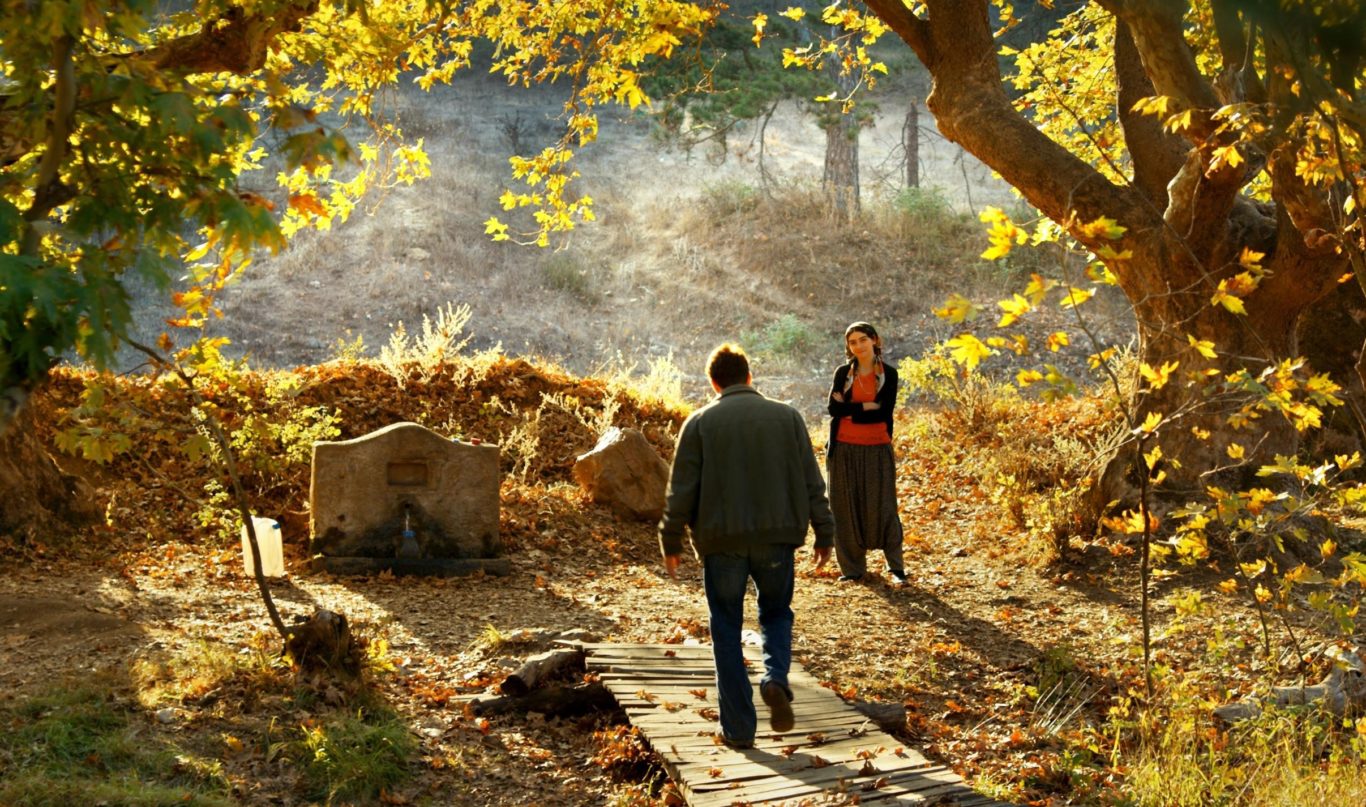
Quick run to the AirBnB to change into a look I workshopped through the festival, called The Divorced Dad’s Black Tie (requisite tuxedo jacket + the loosest of bowties, business casual Kohl’s shirt with the top button undone and a coffee stain at the breast pocket and the sleeves rolled high, whatever black pants don’t stink, sunglasses) and we’re back in the action! And by “the action” I mean a two hour line in direct sunlight, to hopefully catch the 6:30pm premiere of The Wild Pear Tree.
Hard-learned tip corner: Unlike some other spaces at Cannes, the Grand Lumiere’s Last Minute line is pretty evenly split between pre- and post-security, both of which are outdoors. It is also likely the longest line one will stand in, and leads to a theatre with A) no clear restroom options and B) no appropriate time to use said options if they did exist. Take advantage of the pre-security line with a bigger water bottle and some snack food. Come armed with an empty 50cl bottle to transfer to when the security line forces you to leave all that at the gate. Bring sunscreen if you want to live. No need to put on the coat or bowtie until the exact moment the line starts moving — but then, hurry. Finally, stay hydrated while remembering that you will have at least 4 hours until your next chance at a restroom — 5+ if you happen to be seeing a 180 minute Turkish epic. So maybe don’t go too gung-ho on the whole “I can chug this whole 1.5L bottle before security” thing.
Having gone too gung-ho on the whole “I can chug this whole 1.5L bottle before security” thing, I was already hurting by the time I was seated — in the second-to-front row, in full visibility of the Director’s seat. An internal war raged over the relative shames of “Getting up in the middle of a movie in view of the director” and “Pissing one’s dress pants on the sly.” Ever conscious of social faux pas, I opted for route two. Or, as luck would have it, route three: “accepting that the pain will never go away, redirecting one’s nerve endings elsewhere, and hoping for the best.”
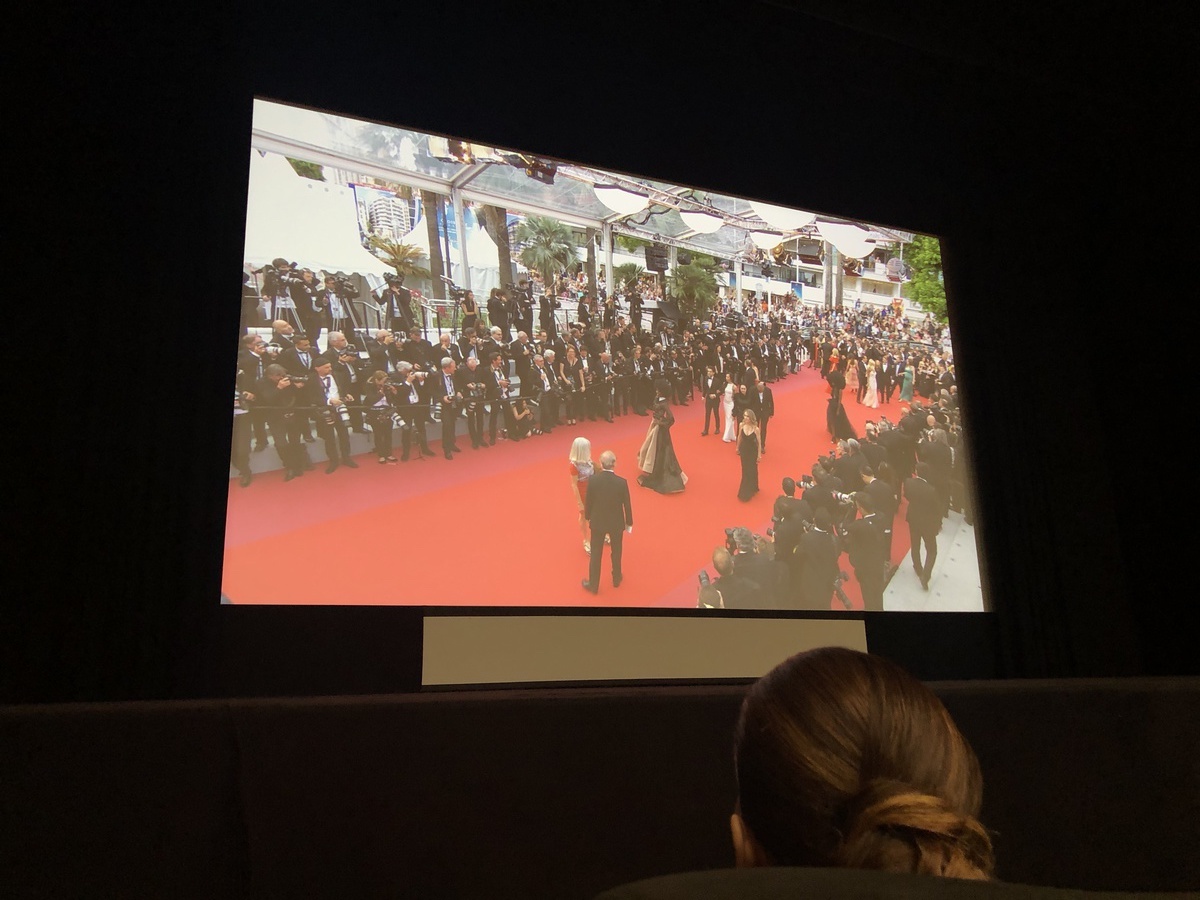
View from the seat. Note the English subtitle bar below the screen, and the trapped man with 1.5L of water in his bladder behind the camera.
The best did arrive, on multiple fronts: I’m happy to report that I not only survived The Wild Pear Tree (Turkish: Ahlat Agaci), I quite loved it. Nuri Bilge Ceylan’s latest reads like one of those memoir-esque slow burns a novelist might write some years after their initial burst of fame — still in full command of their powers but with much less to prove, their fire having cooled into something more introspective, tender, bemused. (Zadie Smith’s Swing Time, Michael Chabon’s Moonglow, and Marilynne Robinson’s Gilead are on my mind as recently-discovered examples.) It’s a sprawling, messy, and very talky epic about everyday creativity; a meditation on the relative virtues of artistic purity and contentment, passion and stability. But it’s also a gentle coming-of-age story, a portrait of the artist (director?) as a young man as he navigates love, faith, economic angst, and familial strife in modern-day Canakkale. It’s Chekhov meets Linklater, but it’s so much more than that. You can be a lot of things, it turns out, with three hours to burn.
Sinan (Dogu Demirkol) is a young man looking to carve out a life for himself. A fresh-faced college grad but not yet employed, he’s in that transitory phase where everything is amplified to its most romantic extreme. He’s an aspiring novelist who wants his work to bleed something new; it’s metafictional, it’s memoir-esque, it’s kind of hopeful but also dark and honest, it’s kind of about the countryside and its wild pear trees, but also about every possible goddamn thing. He sees faults in even those authors he admires, moments of weakness or saccharine shortcuts that a True Artist ought never take. He’s resigned to a life with precisely two options: either sell his novels, or die a failure. After all, what other route is there? That of his father (Murat Cemcir), the pie-in-the-sky go-getter who gambled his family’s livelihood away? Or his mother (Bennu Yildirimlar), the warmhearted realist who tamped down her dreams to be saddled to him? His childhood friend Hatice (Hazar Ergüçlü), preordained for a loveless marriage of “what-if”s and servitude in the same godforsaken village she was born? An imam like his grandfather and so many around him, peddling comfortable falsehoods for respect and cash?
If it isn’t clear yet, I don’t agree with these reductive takes. Neither, I’m sure, does Ceylan — his third act, in particular, has some beautiful reversals up its sleeve. It’s clear that Sinan has a lot of learning to do. At the same time, we never veer into satire at the young man’s expense. Like Chekhov’s Konstantin, his youthful fire is able to brighten and burn in equal measure; we see the blindspots in his black-and-white certainty, but we also remember how good it felt to be so sure. Of anything. As the year unfolds, and Sinan wanders through various Linklater-esque conversations, we start to see both the cracks in his armor and the context that fortified it. There’s the extended argument with a novelist (Serkan Keskin) that feels right out of Waking Life, an impassioned battle between two levels of truths — Sinan’s technicalities about integrity and the artistic process vs the author’s higher truth that there’s more to life than purity. How many times has my own life fit that template, be it theology or politics or (hell) taste in film? We run so easily to one particular battle, till age (slowly) reveals we’ve been fighting the wrong war — missing the forest for the pear tree. There’s also the heart-wrenching confrontation with his mother a la Boyhood, where Sinan’s attempt at a tough love speech only proves how little he understands about toughness or love. Or the complementary arguments with his father, the fulcrum of the film, who Sinan doesn’t seem to realize is the logical end of his own brash idealism: he can be loved as a child or he can be read as a brilliant thinker, but never from the same source. And, perhaps most memorably, we’re treated to a Before-style walk-and-chat with two competing imams, a hard-liner and a pragmatist, pretending to instruct Sinan while secretly debating each other. Each party represents a facet of Turkey’s complicated relationship with religion: should it provide top-down instruction, bottom-up comfort, or be handwaved away like an offer of tea?
As with Ceylan’s brilliant Once Upon a Time In Anatolia, Wild Pear Tree is in love with its scenery — the muted greens and browns of an autumn countryside, a snow-covered landscape shrouded by mist. Wide, silent shots punctuate the talky bits beautifully. But gone (for the most part) are the heavier stylistic flourishes, the slow pans through candlelit darkness or tracking shots of some tiny natural ripple. It’s a less showy, stripped down affair. It lulls us into each conversation, giving us just enough beauty to stay invested but never so much that its style overtakes its substance. In that sense, it’s doubtful this will be lauded with the extreme praise of his last two outings. But in my mind, the simplicity is a virtue that raises it above the pack. It’s exactly how this story needed to be told: an understated pace to temper its overstated protagonist.
There is one exception to that no-flourish rule: the closing shot. I won’t spoil it; it’s gorgeous, and haunting. Instead, I’ll leave you with the passage I thought of as it played — a wildly romantic philosophy text that, if we’re being honest, meant much more to me in my Sinan days, back before I learned to take such things with a grain of salt. It comes from Camus’ The Myth of Sisyphus:
All Sisyphus’ silent joy is contained therein. His fate belongs to him. His rock is a thing. Likewise, the absurd man, when he contemplates his torment, silences all the idols. In the universe suddenly restored to its silence, the myriad wondering little voices of the earth rise up. Unconscious, secret calls, invitations from all the faces, they are the necessary reverse and price of victory. There is no sun without shadow, and it is essential to know the night. The absurd man says yes and his efforts will henceforth be unceasing. If there is a personal fate, there is no higher destiny, or at least there is, but one which he concludes is inevitable and despicable. For the rest, he knows himself to be the master of his days. At that subtle moment when man glances backward over his life, Sisyphus returning toward his rock, in that slight pivoting he contemplates that series of unrelated actions which become his fate, created by him, combined under his memory’s eye and soon sealed by his death. Thus, convinced of the wholly human origin of all that is human, a blind man eager to see who knows that the night has no end, he is still on the go. The rock is still rolling.
I leave Sisyphus at the foot of the mountain! One always finds one’s burden again. But Sisyphus teaches the higher fidelity that negates the gods and raises rocks. He too concludes that all is well. This universe henceforth without a master seems to him neither sterile nor futile. Each atom of that stone, each mineral flake of that night filled mountain, in itself forms a world. The struggle itself toward the heights is enough to fill a man’s heart. One must imagine Sisyphus happy.
Next week: Yommedine, Under the Silver Lake, Palme d’Or winning Shoplifters, and the close of the festival.